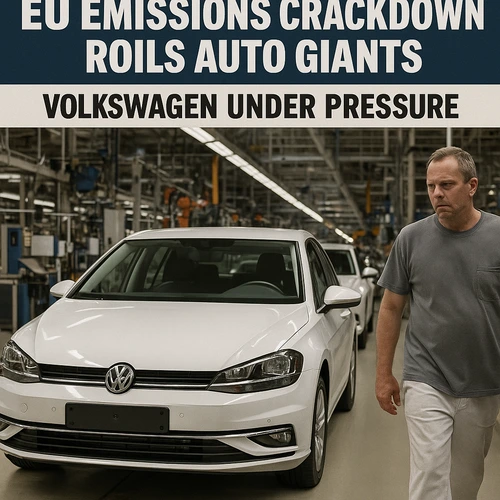Policy Shift Targets Auto Sector Emissions
The European Commission has unveiled a new set of stringent emission standards—informally dubbed “Euro 8”—accelerating the regulatory clampdown on CO₂ emissions for automakers. The policy mandates a 40% reduction in fleet-average CO₂ emissions by 2029, moving up prior timelines.
This policy shift has sent shockwaves across the European auto sector, particularly for manufacturers heavily invested in combustion engine vehicles.
Volkswagen AG (XETRA: VOW3), despite its EV pivot, remains deeply exposed due to its legacy ICE portfolio and manufacturing footprint.
2. Volkswagen Snapshot: Financial Overview
Ticker: VOW3.DE
Price (Aug 1 Close): €112.20
Market Cap: €72.5 billion
Q2 Revenue: €80.9 billion (+3.2% YoY)
Q2 EBITDA: €9.1 billion (–2.5% YoY)
Net Income: €3.6 billion (–4.1% YoY)
Free Cash Flow: €2.4 billion
Dividend Yield: 5.1%
Debt/Equity: 0.48
3. Market Reaction: Sector-Wide Selloff Intensifies
The Euro 8 announcement catalyzed immediate negative sentiment:
- Volkswagen (VOW3): –6.1% over two sessions
- Stellantis (STLAM.MI): –5.3%
- BMW (BMW.DE): –4.8%
- Daimler Truck (DTG.DE): –5.6%
- EU Auto Sector ETF (EXV5.DE): –4.9% cumulative decline
Investors are concerned about capital expenditure blowouts, margin erosion, and potential non-compliance penalties.
4. Strategic Implications: Can Volkswagen Pivot Fast Enough?
While VW has committed over €180 billion towards electrification and software through 2030, its ICE-heavy volume brands (Volkswagen, Skoda, SEAT) still constitute over 60% of group deliveries.
Key challenges:
- Accelerating EV production timelines for Europe
- Potential write-offs on combustion engine investments
- Dependency on battery supply chain scalability
- Re-pricing of older vehicle models to meet compliance costs
The EV push is strategic, but Euro 8 forces a compressed timeline, raising execution risks.
5. Technical View: Support Levels at Risk
Price Trend: €112.20
20-day SMA: €116.85
50-day SMA: €118.40
RSI: 42 (Near Oversold)
52-week High: €138.70
Key Support: €108.00
Resistance: €115.00
A break below €108.00 could expose the stock to a retest of the €100–102 zone. Any policy relaxation or favorable Q3 guidance could trigger a bounce back to €115.
6. Risks & Catalysts to Watch
Risks:
- Supply chain delays in EV battery production
- High R&D expenses crimping free cash flow
- Compliance fines for legacy ICE fleets
- Margin squeeze from aggressive discounting
Catalysts:
- Potential EU state subsidies for EV production
- Positive Q3 production numbers
- Accelerated EV market share gains
- Favorable raw material price shifts (e.g., lithium, nickel)
7. Peer Comparison: Competitive Pressure
| Company | Ticker | P/E | EBITDA Margin | FCF Yield | Dividend |
|---|---|---|---|---|---|
| Volkswagen | VOW3.DE | 5.9 | 11.2% | 7.8% | 5.1% |
| BMW | BMW.DE | 6.4 | 13.5% | 6.5% | 4.8% |
| Stellantis | STLAM.MI | 4.7 | 14.1% | 9.2% | 7.1% |
VW trades at a valuation discount, but with higher regulatory overhang relative to Stellantis and BMW.
8. Forward Scenarios: The Next 6–12 Months
| Scenario | VW Stock Price | Triggers |
|---|---|---|
| Bull Case | €125–130 | EV ramp exceeds targets, EU subsidies mitigate costs |
| Base Case | €105–115 | Gradual compliance adaptation, margin compression |
| Bear Case | €95–100 | Execution delays, non-compliance fines |
9. Strategic Takeaway: Value Trap or Transformation Opportunity?
Short-Term: The regulatory overhang adds valuation pressure. Tactical traders may look for swing trades between €108–115.
Mid-Term: VW’s execution on EV ramp-up, margin control, and supply chain agility will dictate stock trajectory.
Long-Term: If VW navigates the compliance cost maze and leverages scale effectively, it can emerge as a re-rated EV powerhouse. If not, valuation may remain capped.
Final Verdict
Volkswagen faces a compressed timeline to reinvent itself, but its capital base and supply chain investments provide a fighting chance. For value investors, this might be a rare entry point—provided you have a multi-year horizon.
Disclaimer: This is not financial advice. Please consult with your financial advisor before making investment decisions.

